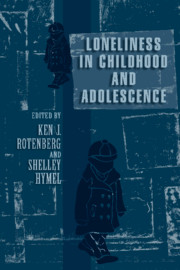Book contents
- Frontmatter
- Contents
- Contributors
- PART I INTRODUCTION
- PART II THEORETICAL AND ASSESSMENT ISSUES
- PART III LONELINESS IN CHILDHOOD
- 6 Loneliness During Early Childhood: The Role of Interpersonal Behaviors and Relationships
- 7 Connections Among Loneliness, the Ability to Be Alone, and Peer Relationships in Young Children
- 8 A Social-Information-Processing Approach to Children's Loneliness
- 9 Parental Antecedents of Children's Loneliness
- 10 Dimensions of Children's Friendship Adjustment: Implications for Understanding Loneliness
- PART IV LONELINESS IN ADOLESCENCE
- PART V PROSPECTIVE
- References
- Author Index
- Subject Index
- Plate section
8 - A Social-Information-Processing Approach to Children's Loneliness
Published online by Cambridge University Press: 13 October 2009
- Frontmatter
- Contents
- Contributors
- PART I INTRODUCTION
- PART II THEORETICAL AND ASSESSMENT ISSUES
- PART III LONELINESS IN CHILDHOOD
- 6 Loneliness During Early Childhood: The Role of Interpersonal Behaviors and Relationships
- 7 Connections Among Loneliness, the Ability to Be Alone, and Peer Relationships in Young Children
- 8 A Social-Information-Processing Approach to Children's Loneliness
- 9 Parental Antecedents of Children's Loneliness
- 10 Dimensions of Children's Friendship Adjustment: Implications for Understanding Loneliness
- PART IV LONELINESS IN ADOLESCENCE
- PART V PROSPECTIVE
- References
- Author Index
- Subject Index
- Plate section
Summary
What do most boys/girls do when they want to be mean to another boy/girl? They try to beat them up if they're mad. … Stop being that person's friend. … They don't speak to them anymore. … Fight and act unkind. … They cuss at them usually. … They roll their eyes and talk about them. … Try to kick their butts. … Thumb their nose and walk away. … Tell lies about that person.
What do most boys/girls do when they want to be nice to another boy/girl? They ask them to hang out with them. … They talk to them or loan them stuff. … They say nice things. … Suck up. … Let them go bike riding and let them play games. … Play with them at recess. … Cheer them up and help them. … Say they are sorry and pat them. … Stand in front of them if they are getting bullied.
As the earlier responses illustrate, children are likely to experience a variety of events in the course of their day-to-day interactions with peers, both positive and negative. For example, on any given school day, a child may receive support from a friend when she scores poorly on an exam, she may be teased by the class bully when he notices a small tear in her dress, or she may be simply ignored by her classmates most of the day. What do these kinds of peer experiences mean to children, and how do they affect the conclusions children draw about themselves and others in social contexts (e.g., about how lonely or dissatisfied they feel with their peer relationships)? These questions are the focus of present chapter.
- Type
- Chapter
- Information
- Loneliness in Childhood and Adolescence , pp. 153 - 175Publisher: Cambridge University PressPrint publication year: 1999
- 8
- Cited by



